|
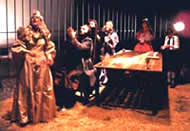  The founder of Macedonian dramatic literature and theatrical activity in the Macedonian language was Jordan Hadzi Konstantinov-Dzinot. In the middle of the 19th century, this outstanding Macedonian revivalist created the possibility, through a number of dramolets (short plays), for a new spiritual expression of Macedonian — in other words, he created the Macedonian theatre. In December 1874, the first performance of the Veles Theatre Amateurs, A Failed Merchant or a Death Sentence was presented in Veles. A few months later, a drama section was formed in Veles within the framework of the Spark Association for National Education. Soon the second premiere was performed, this time the play The Most Suffering Genevieve, where, for the first time in the history of the Macedonian theatre, a role was played by a woman — T. A. Kolarova. Until then, female roles were played by men. The founder of Macedonian dramatic literature and theatrical activity in the Macedonian language was Jordan Hadzi Konstantinov-Dzinot. In the middle of the 19th century, this outstanding Macedonian revivalist created the possibility, through a number of dramolets (short plays), for a new spiritual expression of Macedonian — in other words, he created the Macedonian theatre. In December 1874, the first performance of the Veles Theatre Amateurs, A Failed Merchant or a Death Sentence was presented in Veles. A few months later, a drama section was formed in Veles within the framework of the Spark Association for National Education. Soon the second premiere was performed, this time the play The Most Suffering Genevieve, where, for the first time in the history of the Macedonian theatre, a role was played by a woman — T. A. Kolarova. Until then, female roles were played by men.
The true founder of contemporary Macedonian theatre is Vojdan Cernodrinski, an idealist who strongly believed in the ideals of his people and the freedom of his homeland. Through his dramatic and theatre works, Cernodrinski and his theatre group, the Young Macedonian Company, carried out an important dramatic and national mission. The premiere of his play Macedonian Blood Wedding, performed on 7th November 1900, represented a significant date for the Macedonian theatre. This play is still included in today’s repertoires of today’s Macedonian theatres.
The first permanent theatre in Macedonia was established in late 1913 — the Serbian National Theatre, with Branislav Nusic as its manager. In the 1927-28 season, Lence From Kumanovo by Vasil lljoski, the first play in Macedonian, was performed on the stage of this theatre — unfortunately, only for a short run. With considerable alteration, it was staged again in the Serbian Theatre in Skopje in 1936, and achieved great success.
One year after the premiere of Lence From Kumanovo in 1928, Anton Panov presented "the play with singing from south Serbian life in four scenes" — Migrant Workers. The premiere of this play was performed in Skopje in 1936 and made "a deep impression on the audience, at a level never previously seen," according to critics. The Migrant Workers remained on the repertoire list until 1940, with 71 performances and a total audience of 28,423.
On 27th April 1937, the premiere of the second play by Vasil lljoski, He Trod on Man (later known under the name The Rich Man Theodos), was performed. In the end of December 1938, the premiere of the play Money Kills, written in Macedonian by Risto Krle, was performed on the stage of the Skopje theatre.
However, in the announcements and in the official media it was persistently introduced as "a play written in a south Serbian dialect," part of the extensive non-recognition of the Macedonian people within the Kingdom of Yugoslavia — and hence, the non-recognition of the Macedonian language.
In the 1939-40 season, Krle's second play Antica was performed, and in the autumn of 1940, his third work, the play Millions of Martyrs saw its premiere, as well. The period of the appearance of the works of lljoski, Panov, and Krle is a period of a steady penetration of the Macedonian vernacular into literature.
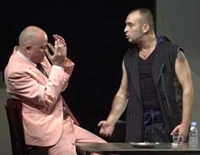  Bitola has had a regular theatrical life since 1918, when the Military Theatre of Tosa Jovanovic became the City Theatre of Bitola. Due to financial difficulties, the Bitola theatre's work was continually interrupted until August 1924, when, by an official act of the Ministry of Education, it was proclaimed a state institution under the name City Theatre. In April 1926, Skopje and Bitola theatres were united within a single theatre institution, under the common name the Skopje-Bitola National Theatre. Only a year later, the Skopje theatre separated from Bitola, and the theatrical group from the latter town was dismissed. In fact, Skopje artists were not in need of a theatre building any more — the new Skopje Theatre by the Vardar River had been completed. After many problems and obstacles from 1932 to 1937, the theatre in Bitola operated as Good Field Theatre. Its members included many fine artists, who remained devoted to the theatre, including Petar Veljanovski, Pavle Pavlovski, Boris Boslakovski, Petar Zezoski, and Vele Goco, as well as young Dimce and Aco Stefanovski. Bitola has had a regular theatrical life since 1918, when the Military Theatre of Tosa Jovanovic became the City Theatre of Bitola. Due to financial difficulties, the Bitola theatre's work was continually interrupted until August 1924, when, by an official act of the Ministry of Education, it was proclaimed a state institution under the name City Theatre. In April 1926, Skopje and Bitola theatres were united within a single theatre institution, under the common name the Skopje-Bitola National Theatre. Only a year later, the Skopje theatre separated from Bitola, and the theatrical group from the latter town was dismissed. In fact, Skopje artists were not in need of a theatre building any more — the new Skopje Theatre by the Vardar River had been completed. After many problems and obstacles from 1932 to 1937, the theatre in Bitola operated as Good Field Theatre. Its members included many fine artists, who remained devoted to the theatre, including Petar Veljanovski, Pavle Pavlovski, Boris Boslakovski, Petar Zezoski, and Vele Goco, as well as young Dimce and Aco Stefanovski.
The existence of a theatre in Skopje does not imply that there was not any theatrical activity in other places throughout Macedonia. The theatrical play had considerable influence in spreading love for the theatre and developing in many towns — Bitola, Veles, Gevgelija, Prilep, Tetovo, Strumica, Ohrid, and in Skopje, as well. Until 1940, the territory of the Republic of Macedonia was crisscrossed by traveling theatres, mostly from Serbia. Among them were the State Privileged Boemi Vardar Theatre of Petre Prlicko and the theatre of Dimce Trajkovski. Todorce Nikolovski and Trajko Corevski were members of the latter theatre for a time.
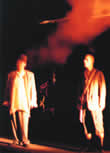  In November 1944, immediately after the liberation of Skopje, the first professional theatre in Macedonia was established. The artists, mainly members of the military Koco Racin Cultural and Artistic Group, composed the ensemble of the new Macedonian National Theatre. These men and women included Petre Prlicko, Todor Nikolovski, Ilija Dzuvalekovski, Meri Boskova, Kiro Kjortosev, Todorka Kondova, Ilija Milcin, Krum Stojanov, Cvetanka Jakimovska, Toma Kirovski, Dobrila Puckova, Stojka Cekova, Boris Stefanovski, Vukan Dinevski, Darko Dameski, Dragi Kostovski, Dragi Krstevski, and Aco Jovanovski. The first manager of the theatre, Dimitar Kjostarov, and actors Petre Prlicko and Ilija Milcin were engaged as directors. Other theatres were staffed by the following artists [actors]: Bitola: Dusan Naumovski, Kosta Dzekoski, Aco and Dimce Stefanovski, Petar Veljanovski, Petar Stojkoski, Olga Naumovska, Ljubisa Trajkovski; Prilep: Mirko Stefanovski, Nada Gesovska, Dimitar Gesovski, Kiril Zezoski, Cane Nasoski, Rampo Koneski, Pravda Ilic; Stip: Aleko Protogerov, Ilija Arev, Ruza Ikonomova, and Toma Gagovski; Veles: Boris Beginov, Nikola Dimitrov, and Olivera Nikolova; Strumica: Stojan Gagov and Aleksandar Dumov; Kumanov Gjoko Nikolovski and Petar Tasevski; Tetov Panta Nikolic, Ace Cvetkovski, Pance Kamdzik, and Ubavka Slavuic; Turkish Drama Company of the Theatre of Nationalities: Erdan Maksut, Mustafa Yashar, Ekasa Kaso, and Atila Klince; Albanian Drama Company of the Theatre of Nationalities in Skopje: Mark Marku, Bajrush Mjaku, Sefedin Nuredini, Silvana Bajcinovci, Liman Nijazi, and Teuta Ajdini. In November 1944, immediately after the liberation of Skopje, the first professional theatre in Macedonia was established. The artists, mainly members of the military Koco Racin Cultural and Artistic Group, composed the ensemble of the new Macedonian National Theatre. These men and women included Petre Prlicko, Todor Nikolovski, Ilija Dzuvalekovski, Meri Boskova, Kiro Kjortosev, Todorka Kondova, Ilija Milcin, Krum Stojanov, Cvetanka Jakimovska, Toma Kirovski, Dobrila Puckova, Stojka Cekova, Boris Stefanovski, Vukan Dinevski, Darko Dameski, Dragi Kostovski, Dragi Krstevski, and Aco Jovanovski. The first manager of the theatre, Dimitar Kjostarov, and actors Petre Prlicko and Ilija Milcin were engaged as directors. Other theatres were staffed by the following artists [actors]: Bitola: Dusan Naumovski, Kosta Dzekoski, Aco and Dimce Stefanovski, Petar Veljanovski, Petar Stojkoski, Olga Naumovska, Ljubisa Trajkovski; Prilep: Mirko Stefanovski, Nada Gesovska, Dimitar Gesovski, Kiril Zezoski, Cane Nasoski, Rampo Koneski, Pravda Ilic; Stip: Aleko Protogerov, Ilija Arev, Ruza Ikonomova, and Toma Gagovski; Veles: Boris Beginov, Nikola Dimitrov, and Olivera Nikolova; Strumica: Stojan Gagov and Aleksandar Dumov; Kumanov Gjoko Nikolovski and Petar Tasevski; Tetov Panta Nikolic, Ace Cvetkovski, Pance Kamdzik, and Ubavka Slavuic; Turkish Drama Company of the Theatre of Nationalities: Erdan Maksut, Mustafa Yashar, Ekasa Kaso, and Atila Klince; Albanian Drama Company of the Theatre of Nationalities in Skopje: Mark Marku, Bajrush Mjaku, Sefedin Nuredini, Silvana Bajcinovci, Liman Nijazi, and Teuta Ajdini.
While at the Macedonian National Theatre preparations were begun for the first premiere of the play Platon Kretchet by A. Korneychuk, the ensemble performed short plays with war themes. The premiere of Platon Kretchet was performed on 3rd April 1945, the beginning of the rapid development of contemporary Macedonian theatrical arts. Within 20 years, the Macedonian National Theatre can boast of more than 60 premieres, including those of local Macedonian authors like lljoski and Casule, classics of Yugoslav drama such as Krleza, Nusic, Cankar, Marinkovic, and masters of drama such as Shakespeare, Moliere, Gogol, Ostrovsky, Gorky, Schiller, and Shaw.
In the autumn of 1944, a professional theatre was established in Bitola, as well, and over the course of the following years such theatres were founded in other major cities in Macedonia. Today, there are professional theatres in Skopje (the Drama Company of the Macedonian National Theatre, the Drama Theatre, the Theatre of the Nationalities with the Albanian and Turkish Drama Companies, and the Children's Theatre), Bitola, Kumanovo, Prilep, Stip, Veles and Strumica. A remarkable role in the theatre life of Macedonia was played by the Romani Theatre in Skopje, but the institution moved to Germany a few years ago.
Over the past decades, the Macedonian theatre achieved remarkable progress accompanied by a policy of extensive programs and clearly expressed aesthetic trends, supplementing the list of artists who improved its reputation and made its presence in the cultural life of Macedonia one of the key components of the spiritual superstructure. New playwrights emerged: Branko Pendovski, Tome Arsovski, Zivko Cingo, Goran Stefanovski, and Jordan Plevnes in the first generation, and Zanina Mircevska, Maja Stefanovic, Dejan Dukovski, Ognen Nedelkovski, and Jugoslav Petrovski in the second generation.
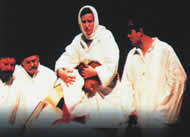  Ljubisa Georgievski, Slobodan Unkovski, Vladimir Milcin, Branko Stavrev, Kole Angelovski, Rahim Burhan, Dusko Naumovski, Aco Aleksov, Dimitar Hristov, Ljupco Tozija, Georgi Stojanovski, Stojan Stojanovski, Vladimir Cvetanovski, Saso Milenkovski, Goran Trencovski, Aleksandar Popovski, Darko Mitrevski, and Ljupco Gjorgievski all directed theatres in Macedonia, as well as performing numerous guest performances in the United States, Soviet Union, Poland, Czechoslovakia, Bulgaria, and theatres throughout former Yugoslavia. The accomplishments of these actors and directors promoted the place of the Macedonian theatre among international circles. Ljubisa Georgievski, Slobodan Unkovski, Vladimir Milcin, Branko Stavrev, Kole Angelovski, Rahim Burhan, Dusko Naumovski, Aco Aleksov, Dimitar Hristov, Ljupco Tozija, Georgi Stojanovski, Stojan Stojanovski, Vladimir Cvetanovski, Saso Milenkovski, Goran Trencovski, Aleksandar Popovski, Darko Mitrevski, and Ljupco Gjorgievski all directed theatres in Macedonia, as well as performing numerous guest performances in the United States, Soviet Union, Poland, Czechoslovakia, Bulgaria, and theatres throughout former Yugoslavia. The accomplishments of these actors and directors promoted the place of the Macedonian theatre among international circles.
In the meantime, and particularly after the opening of the Faculty of Dramatic Arts in Skopje, young artists free from theatrical prejudice appeared on stages throughout Macedonia. Participating in the most significant performances and companies of former Yugoslavia — the Sterija's Theatre, the Small Scenes Festival in Sarajevo, and so on — many of them, directors alike, won high praises and awards.
Here one should certainly mention the names of Risto Siskov, Meto Jovanovski, Milica Stojanova, Joana Popovska, Mite Grozdanov, Snezana Stameska, Nenad Stojanovski, Vladimir Svetiev, Dusko Kostovski, Kiril Andonovski, Kiril Ristovski, Ance Dzambazova, Slavco Ninov, Kole Angelovski, Petar Temelkovski, Stevo Spasovski, Emil Ruben, Sabina Ajrula-Tozi, Bediya Beyoglu, Salaetin Bilal, Katina Ivanova, Snezana Konevska-Rusi, Mimi Tanevska, Silvija Stojanovska, Emilija Andreeva, Sonja Mihajlova, Gjorgi Jolevski, Petar Mircevski, Filimen Dzinev, Katerina Kocevska, Nikola Ristanovski, Magdalena Rizova, Senko Velinov, Dragan Spasov, Biljana Belicanec, Biljana Tanevska, Igor Dzambazov, Vlado Jovanovski, etc.
  The number of non-professional and amateur theatre companies throughout the Republic is considerable. In the 1990-91 season, the Bitola theatre staged 13 plays with a total of 146 performances, attracting a combined audience of 56,500. During the same season, the Kumanovo theatre presented only four works with a total of 31 performances for a combined audience of 6,630. Five works were performed by the Prilep theatre 90 times, for the enjoyment of 23,330. In the same season, the Skopje theatres staged 60 plays and 531 performances before a grand total of 193,481 patrons of the arts. The Strumica theatre performed seven plays 61 times and attracted 17,621. The theatre in Titov Veles presented four plays for 85 performances before a total audience of 30,450. Finally, the Stip theatre had five premieres in that same season with 75 performances and a grand attendance of 19,450. The number of non-professional and amateur theatre companies throughout the Republic is considerable. In the 1990-91 season, the Bitola theatre staged 13 plays with a total of 146 performances, attracting a combined audience of 56,500. During the same season, the Kumanovo theatre presented only four works with a total of 31 performances for a combined audience of 6,630. Five works were performed by the Prilep theatre 90 times, for the enjoyment of 23,330. In the same season, the Skopje theatres staged 60 plays and 531 performances before a grand total of 193,481 patrons of the arts. The Strumica theatre performed seven plays 61 times and attracted 17,621. The theatre in Titov Veles presented four plays for 85 performances before a total audience of 30,450. Finally, the Stip theatre had five premieres in that same season with 75 performances and a grand attendance of 19,450.
From 4th June to 10th June 1965, the First Festival of Professional Theatres of the Republic was held in Prilep, organised by the Association of the Drama Artists of Macedonia. The festival was named in honour of the founder of the drama and theatre life on this territory, Vojdan Cernodrinski. Since that day, the finest works of Macedonian theatres are presented each year at the festival in Prilep. The Vojdan Cernodrinski Theatre Festival played a crucial role in upgrading the quality of the Macedonian theatre, at the same time stimulating both contemporary Macedonian drama literature and the polyphony of the theatrical play.
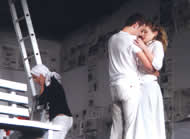  In May 1976, a group of young enthusiasts founded the Open Youth Theatre Festival (MOT) in Skopje. More than 250 theatrical performances have been presented at this festival so far, most of them by alternative, experimental theatre groups engaging young writers and actors. In former Yugoslavia, the Open Youth Theatre was a festival in which every one wished to take part and to display their talent! For several years now, the Open Youth Theatre has been an international festival: to date, guest performances within its framework have been given in Skopje by groups from the successor states of the former Yugoslavia, the United States, France, the Soviet Union, Russia, Spain, Japan, Poland, Italy, the United Kingdom, India, and other countries. Recently, the Open Youth Theatre became a member of the Brussels Informal European Theatre Meeting (IETM), a network of 250 world theatre festivals, institutes, and companies. Within the framework of the Open Youth Theatre, a Macedonian National Centre of the International Theatre Institute (ITI) was established, and at the 25th ITT World Congress in Munich in 1993, it was received as a regular member of this theatre association. In May 1976, a group of young enthusiasts founded the Open Youth Theatre Festival (MOT) in Skopje. More than 250 theatrical performances have been presented at this festival so far, most of them by alternative, experimental theatre groups engaging young writers and actors. In former Yugoslavia, the Open Youth Theatre was a festival in which every one wished to take part and to display their talent! For several years now, the Open Youth Theatre has been an international festival: to date, guest performances within its framework have been given in Skopje by groups from the successor states of the former Yugoslavia, the United States, France, the Soviet Union, Russia, Spain, Japan, Poland, Italy, the United Kingdom, India, and other countries. Recently, the Open Youth Theatre became a member of the Brussels Informal European Theatre Meeting (IETM), a network of 250 world theatre festivals, institutes, and companies. Within the framework of the Open Youth Theatre, a Macedonian National Centre of the International Theatre Institute (ITI) was established, and at the 25th ITT World Congress in Munich in 1993, it was received as a regular member of this theatre association.
Drama takes a notable role within the framework of the Ohrid Summer Music and Theatre Festival, with theatre projects specially prepared for this international event. Only three years after beginning the first musical performances at the Ohrid Summer Festival, in 1964, As You Like It by Shakespeare, directed by Dimitar Kjostarov, was peformed, soon followed by the collage Laughing Is Not a Sin produced by Ilija Milcin and Toma Kirovski. Both were performed by members of the Macedonian National Theatre.
During the year, several other theatre festivals are held in the Republic of Macedonia, including the Festival of the Amateur Theatres in Kocani (FAT), the Days of Risto Siskov in Strumica, and theatre projects presented within the International Festival of Popular and Classical Music in Bitola.
From Macedonia Yesterday and Today by Jovan Pavlovski & Misel Pavlovski (www.mian.com.mk)
Translated by: Zaharija Pavlovska
back |